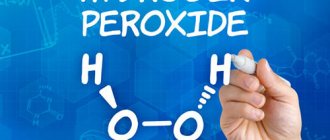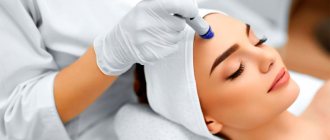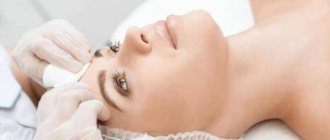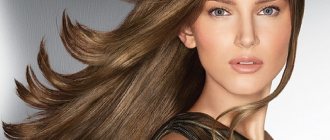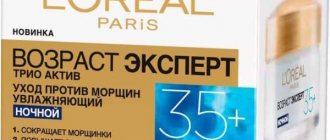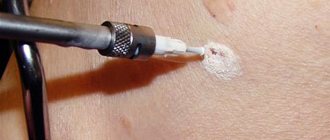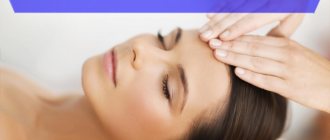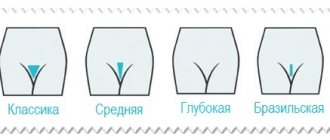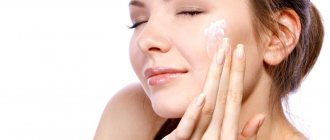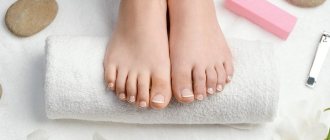How does peroxide work?
Hydrogen peroxide (peroxide) is a well-known antiseptic that is used in cosmetology and is a component of many masks. The recipes are convenient because they can be used at home. If you decide to test whether hydrogen peroxide helps get rid of acne on your face, you should adhere to certain rules. Remember that an overdose can have unpleasant consequences.
Peroxide is a colorless liquid that has a “metallic taste.” It can dissolve in water and alcohol.
The drug has antiseptic properties and belongs to the group of antioxidants. When applied to the skin, peroxide mechanically cleanses and inactivates organic substances in the form of proteins, blood, and pus.
Upon contact, abundant foaming occurs, due to this, blood clots form and the bleeding of small vessels stops. Peroxide is indicated for inflammatory diseases of the mucous membranes, purulent wounds, capillary bleeding, nosebleeds, stomatitis, sore throat, tonsillitis, and gynecological diseases.
Contraindications to treatment are individual intolerance, liver disease, hyperthyroidism. Allowed for use during pregnancy and breastfeeding. When treating the skin, side effects such as burning and an allergic reaction are possible.
Contact with skin causes the peroxide to break down into oxygen and water. This causes an oxidation reaction to occur, which kills germs and lightens the skin on your face several shades. Thanks to this property, hydrogen peroxide has proven itself in cosmetology. It helps to cleanse oily and problematic skin, eliminate acne, blackheads, purulent inflammations, lighten freckles and age spots, and also whiten the skin on the face at home.
However, it is worth noting that oxidation affects not only sick cells, but also healthy cells. When the solution comes into contact with healthy areas, the skin on the face turns white. This indicates a burn. The skin needs a long time to recover, so anti-acne masks should be used infrequently and only in dissolved form.
Advantages of the product
The drug is safe and can be used externally by pregnant women and nursing mothers
The drug is safe and can be used externally by pregnant women and nursing mothers
Compared to drugs intended to treat warts, hydrogen peroxide has a number of advantages. They are as follows:
- Low price. In terms of cost, peroxide is the cheapest solution for removing growths.
- Possibility of use during pregnancy and lactation. If we are talking about external use, then, unlike most specialized drugs for warts, hydrogen peroxide is allowed to be used by pregnant women at all stages and lactating women.
- Diabetics can also treat warts with hydrogen peroxide without any worries.
- Availability. Hydrogen peroxide can be purchased at any pharmacy.
Using hydrogen peroxide against acne: benefits and harms
Like any other product used in cosmetology, hydrogen peroxide has its advantages and disadvantages. The benefits of peroxide include:
- with proper use of the product, the skin on the face is completely cleared of blackheads and pimples;
- the skin on the face brightens and acquires a healthy color;
- dark spots from acne (post-acne) disappear;
- Facial hair is lightened.
The disadvantages of peroxide include the following:
- the drug can burn the skin, so it must be used with extreme caution;
- in some cases, an allergic reaction may occur;
- may cause excessive dryness and flaking of the skin.
The side effects of using hydrogen peroxide for facial acne have not been fully studied. However, many scientists believe that the solution only helps in the initial stages.
With prolonged use, it can cause skin aging. This is due to the fact that peroxide, together with bacteria, destroys healthy areas, which is why the skin is deprived of its natural protection.
Moreover, the solution can lead to allergic reactions, so before using masks you should consult a dermatologist.
Side effects of hydrogen peroxide for acne
Numerous studies have revealed the ability of hydrogen peroxide to damage skin cells through oxidative stress. This concept involves an imbalance between the production of free radicals and the body's ability to neutralize their harmful effects. Hydrogen peroxide destroys acne infection by releasing an oxygen atom and, accordingly, oxidizing the unstable environment of the upper layers of the epidermis. As a result, acne bacteria cannot continue to exist, but detoxification is somewhat reduced.
In many cases, hydrogen peroxide can “whiten” the face by activating the oxidative stress of epidermal proteins. But on the other hand, this process contributes to damage to mitochondria in cells and can subsequently cause their accelerated aging.
The final result of the effect of hydrogen peroxide on the skin is exfoliation of its upper layers along with acne and inflamed elements, similar to the effect of chemical peels. But this advantage is countered by a number of possible side effects, which can be manifested by several factors, including:
• overdrying of the skin; • drying of the natural oils of the epidermis, dehydration of all its layers; • irritation, redness and inflammation of the treated area of the body; • appearance of scars or cicatrices; • worsening and increasing the area of acne due to excessive use of the product and its contribution to an increase in hydrogen atoms in the body.
Despite the well-known property of peroxide to lighten the skin, its active use can cause scarring. The reason is the destruction of fibroblasts, which are designed to regenerate wounds and cuts, as well as reproduce new skin cells. When the body's ability to heal itself decreases, the likelihood of scarring increases.
Instructions for use
If you are planning to get rid of pimples and acne on your face using peroxide, you should know some rules:
- For external use, a weak three percent solution is used. Dilute with tonic or add to the mask in a ratio of no more than 1:5;
- The frequency of using peroxide for the face is twice a week, the duration of the procedure is no longer than 15 minutes;
- When fighting severe acne, peroxide should be applied pointwise, without affecting healthy skin;
- At the end of the procedure, be sure to wash with warm water.
If you follow all the recommendations, peroxide will help dry out the rashes and speed up their healing.
What it is?
Not everyone knows how to treat a wound with hydrogen peroxide. In everyday life, this drug is called hydrogen peroxide (H2O2). This is a disinfectant with hemostatic and deodorizing properties. Hydrogen peroxide is used for rinsing and washing for inflammatory ailments (sore throat, stomatitis), stopping nosebleeds, treating wounds, and more.
Today this antiseptic is the most popular in home medicine cabinets. When it is used, a chemical oxidation reaction occurs, as a result of which atomic oxygen is formed. This substance is a powerful antiseptic, but it can be found very rarely in nature.
Hydrogen peroxide, upon contact with living matter, decomposes in a matter of seconds, destroying all microorganisms that are in its area of action.
Peroxide masks
The following recipes have proven themselves to be the best in the fight against acne.
- Recipe No. 1
Suitable for normal to oily facial skin.
To prepare you will need:
- 1 tablespoon cottage cheese;
- 5 drops of peroxide;
- 1 chicken egg.
Mix all ingredients thoroughly and spread the mixture on your face using a cotton pad. Leave the mask on for 15 minutes. Then rinse it off with warm water and use a moisturizer. The procedure allows you to dry out the rashes and slightly whiten the skin.
- Recipe No. 2
This recipe is suitable for people who are not prone to allergies.
Ingredients:
- 1 tablespoon honey
- 3 drops peroxide
- 1 teaspoon aloe juice.
Mix the ingredients and apply directly to the affected areas. After 15 minutes, wash with cool water.
- Recipe No. 3
Mix 2 tablespoons of yeast with 5 drops of peroxide. As a result, you will get a mass similar to sour cream. Apply the mask in 2-3 layers on your face and leave for 15-18 minutes.
- Recipe No. 4
This recipe helps in the fight against acne and blackheads. You will need 1 teaspoon of white clay, a few drops of peroxide. Mix the ingredients to form a liquid mass. Apply a thin layer of the product to the inflamed areas, rinse after 15 minutes.
- Recipe No. 5
To prepare you will need:
- 2 tablespoons of warm milk;
- 2 tablespoons steamed oatmeal;
- 4-5 drops of hydrogen peroxide.
Mix these ingredients thoroughly until smooth. Apply the product to your face and leave for no more than 20 minutes. After this, wash your face with warm water. Due to the milk in the mask, the skin on the face will receive additional hydration and nutrition, and oatmeal helps eliminate oily shine. You should not use this recipe more than once a week.
Aspirin for acne
Aspirin for acne has been used for many years, even our grandmothers were treated with it, it is an excellent remedy for treating unpleasant and red spots on the skin, which are localized on the face, neck, back, shoulders and décolleté. Aspirin is an anti-inflammatory drug that is effective in treating skin acne. It has acetylsalicylic acid, which helps exfoliate the skin, unclog pores, and also smoothes the skin, removing acne.
Acne is quite common during adolescence due to hormonal changes in the body, but pimples and acne also occur in adult women. Which in turn leads to a deterioration in the appearance of women, girls and boys. The acetylsalicylic acid content in aspirin is the main ingredient in any acne treatment medication. This treatment is the best solution to remove these unpleasant and terrible formations.
Aspirin can be used in combination with other components. It is able to rejuvenate the skin by cleansing old epithelial cells and replacing them with new ones. Aspirin also relieves inflammation, redness and itching by soothing the affected areas of the skin.
Causes of acne on the skin
Acne is a chronic skin condition that manifests itself as inflammation of the skin; pimples appear on various parts of the body. In adolescents, this occurs during puberty due to hormonal changes, as well as in people who experience certain dysfunctions of the skin. Listed below are some of the main causes of acne.
Clogged Follicles – The pores on the skin are connected to the oil glands in the skin, these sacs secrete the skin's natural oil, which keeps your skin moist and supple. Pimples begin to grow when oil secretion is interrupted due to dust or any other factor.
Propionibacterium bacteria - propionibacterium bacteria live on the surface of our skin and cause inflammation and infection, which subsequently leads to acne on the skin.
Hormonal Changes – Changes in the body at the hormonal level can happen at any point in your life and this change mainly affects the health of the skin, hence the appearance of acne. During adolescence, hormonal levels are unstable, this can lead to imbalance, which in turn leads to breakouts on the body.
Emotional stress – Numerous studies have proven that emotional stress causes acne on the skin. Stress affects the hormonal levels of the body and this sudden change in the body causes acne to appear on various parts of the body.
Menstruation - during menstruation, a whole series of changes appear within our body, which also affects the condition of our skin. For some people, acne often forms before or after the menstrual period, so it is considered a common sign of acne. However, not all females are susceptible to such rashes during menstruation.
Oily cosmetics – If the cosmetic product you use on your skin is too oily, then it can cause acne on your face. Therefore, if you notice acne on your face after using such a cosmetic product, then immediately stop further use.
Special medications – If you use certain dosage medications that contain lithium and androgen, the health of your skin may be affected. Such medications can lead to pimples and acne.
What are the benefits of aspirin face masks?
Aspirin masks are very useful for any skin type, but they are especially beneficial for oily, acne-prone skin. Aspirin has the following effects on the skin:
- has anti-inflammatory and antibacterial properties;
- dries out inflammation;
- cleanses the skin well, which in turn removes pimples and blackheads;
- is a good bleaching agent;
- treats fresh scars and acne scars;
- exfoliates dead skin cells, helping the skin regenerate.
Ways to treat acne with aspirin
Pimples and acne are red, inflamed lesions on the skin that cause burning, itching and inflammation. There are several effective ways to treat acne with aspirin, such as lotion, spray, scrub and face mask based on this unique tablet. Below we will look at the best face masks with aspirin that you can prepare at home.
Caution: When using aspirin-based masks, avoid applying to the area around the eyes.
Aspirin and apple cider vinegar mask
To prepare you will need:
5 – 6 tablets of aspirin (acetylsalicylic acid)
1 – 2 teaspoons apple cider vinegar
1 teaspoon water
Crush aspirin in a mortar until a powder forms and add water to it; after the aspirin has dissolved, add apple cider vinegar and mix. Apply the mask to a clean, steamed face, neck and décolleté, paying more attention to the area of pimples and acne, massage a little for a few minutes. Leave the mask on for 15 minutes and rinse off the mask with warm water.
Note: For dry skin, you need to add olive oil to the mask, and for oily skin, you need to add egg white.
This mask will soothe and cleanse the pores of the skin, and also make it smoother and softer. You need to use the mask once a week to get rid of acne on the skin.
Aspirin and honey mask
To prepare you will need:
5 – 6 tablets of aspirin (acetylsalicylic acid)
1 tablespoon natural honey
1 teaspoon almond oil
Crush aspirin in a mortar until a powder forms and add a small amount of water to it; after the aspirin has dissolved, add honey, almond oil and mix. Apply the mask to a clean, steamed face, neck and décolleté, paying more attention to the area of pimples and acne, massage a little for a few minutes. Leave the mask on for 15 minutes and rinse off the mask with warm water. Use this mask once or twice a week. The mask is great for dry skin, because... it eliminates dry skin, and also moisturizes and maintains its elasticity. The mask also perfectly treats scars, leaving the skin smooth and soft. Honey has antibacterial properties that eliminate acne and pimples.
Aspirin and toothpaste mask
To prepare you will need:
5 – 6 tablets of aspirin (acetylsalicylic acid)
1 teaspoon organic toothpaste
Crush aspirin in a mortar until a powder forms and add a small amount of water to it; after the aspirin has dissolved, add organic toothpaste and mix. Apply the mask to a clean, steamed face, neck and décolleté, paying more attention to the area of pimples and blackheads, massage a little for a few minutes. Leave the mask on for 15 minutes and rinse off the mask with warm water. This face mask will help soothe skin irritation and also reduce inflammation.
Aspirin and lemon juice mask
To prepare you will need:
5 – 6 tablets of aspirin (acetylsalicylic acid)
1 tablespoon lemon juice
1 tablespoon cottage cheese
Crush aspirin in a mortar until a powder forms and pour lemon juice over it; after the aspirin has dissolved, add cottage cheese and mix well. Apply the mask to a clean, steamed face, neck and décolleté, paying more attention to the area of pimples and acne, massage a little for a few minutes. Leave the mask on for 20 minutes and rinse it off with cold water. Use this mask once or twice a week to get relief from itching, redness and inflammation. Lemon has antioxidant properties that provide skin protection from harmful free radicals. In addition, lemon perfectly brightens the skin tone and reduces the appearance of acne due to its exfoliating properties.
Aspirin and baking soda mask
To prepare you will need:
6 – 12 tablets of aspirin (acetylsalicylic acid)
1 tablespoon baking soda
1 – 2 tablespoons water
Crush aspirin in a mortar until a powder forms and add water, after the powder has dissolved, apply the mask with a cotton pad to a clean, steamed face, neck and décolleté, paying more attention to the area of pimples and acne, massage a little for a few minutes. Leave the mask for 10 minutes, then rub in baking soda moistened with water. After the procedure, rinse your face thoroughly with cold water. This mask exfoliates dead skin cells well and clears acne.
Aspirin and hydrogen peroxide mask
To prepare you will need:
5 – 6 tablets of aspirin (acetylsalicylic acid)
1 teaspoon hydrogen peroxide
1 teaspoon aloe vera gel
First, crush the aspirin tablets and add a few drops of water to them to get a granular mass. Now add hydrogen peroxide and mix thoroughly. Apply the mask with a cotton pad to a clean, steamed face, neck and décolleté, paying more attention to the area of pimples and blackheads, massage a little for a few minutes. Leave the mask on for 10 – 20 minutes and then rinse your face with cold water. After washing your face, apply aloe vera gel and leave it on for 15 – 20 minutes, after the time is up, rinse again with cold water. Hydrogen peroxide regulates skin oil production. Aloe vera saturates skin cells with moisture and retains it for a while.
Aspirin and yogurt mask
To prepare you will need:
5 – 6 tablets of aspirin (acetylsalicylic acid)
1 tablespoon natural yogurt (no additives or colorings)
Crush aspirin in a mortar until a powder forms and add a small amount of water to it; after the aspirin has dissolved, add natural yogurt and mix. Apply the mask to a clean, steamed face, neck and décolleté, paying more attention to the area of pimples and acne, massage a little for a few minutes. Leave the mask on for 15 – 20 minutes and rinse off the mask with cold water. Yogurt will soothe and moisturize your skin due to its cooling effect and also relieve the skin from dryness, itching and redness due to acne.
Aspirin and witch hazel mask
To prepare you will need:
4 – 5 tablets of aspirin (acetylsalicylic acid)
350 ml liquid witch hazel
120 ml distilled water
Grind the aspirin in a mortar until a fine powder is formed and add it to a bottle (500 ml) with or without a spray, as you prefer. Then pour distilled water and liquid witch hazel into the same bottle and shake the bottle until all the ingredients are well mixed. You need to apply the product with a cotton pad or simply spray it on your face, neck, décolleté, i.e. in areas where there are acne, pimples and leave until the composition dries completely on the skin. After the composition dries, you need to wash it off with warm water. Apply this procedure once or twice a week. Liquid witch hazel is rich in antioxidant properties that kill harmful bacteria that cause acne or other skin inflammation.
Tips and contraindications
Aspirin may cause swelling of the face, avoid using aspirin if you are 16 years of age, and it is contraindicated in pregnant and breastfeeding women. You should also not use aspirin if you drink alcohol in large quantities or are allergic to this drug.
To make sure you are not allergic to aspirin, do a test on a small area of skin. If there is no reaction, then you can use acetylsalicylic acid to treat pimples and acne.
Apply an aspirin mask once or twice a day depending on your skin type and the problem you are trying to correct.
Basic principles of treatment
The location of pimples tells you what and where in the body is going wrong. It is the designation of these failures, the identification of violations, of which there are several, that is the initial and main point at the beginning of treatment. Therapy should be step-by-step and systematic in order to achieve perhaps not immediate, but stable and long-lasting results.
It is necessary to regulate the quantity and quality of sleep, create a balanced and healthy diet, taking into account all mental and physical stress. As well as properly cleansing your skin, it is worth remembering that all products should be suitable for your skin type. Inappropriate hygiene products will not only not do their job, but will also worsen the condition of the skin (especially for oily, rash-prone skin and very dry, vulnerable skin).
Only after all the points have been passed, think about the external healing of acne. In this case it is hydrogen peroxide. However, strict adherence to safety measures is important.
By its properties, peroxide is a strong oxidizing substance that can come into chemical contact with many substances. When applied directly to the inflamed area, it reacts with pathogenic microflora, providing an antiseptic effect. The destruction of harmful bacteria contributes to the rapid subsidence of inflammation.
But, it also affects healthy areas of the skin, somewhat burning it. Therefore, it is necessary to understand how to use it correctly.
